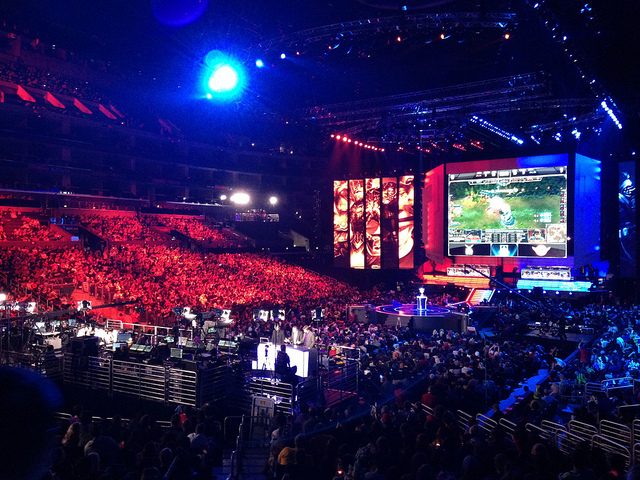There are some people who choose to sit in front of a screen, interacting with digital projections for hours on end. They become completely zoned out to the world around them, ignoring friends and family. The most unhealthy of them get extremely frustrated with the outcomes of these seemingly repetitive games. Casinos even started hosting tournaments, meant to bring these skilled phenoms together, letting the best of them duke it out in a button-mashing brawl. I haven’t been to one of these exciting events, but I can only imagine the tenaciousness of the competitors, the tension of the game play. It’s true, these slot machine players have been a mainstay in casinos since the advent of the industry. Now, esports is starting to take hold in Las Vegas, which means these intrepid traditional gamers are starting to share the barely breathable air of the casino floor.
Esports stands for electronic sports, which are competitions based on games of electronic means. Everyone getting this? We call caught up so far? Live tournaments are based on some of the most popular games. Most of them are free-to-play online multiplayer arena games based on various themes. League of Legends and Dota 2 are popular variants. Even if those are unfamiliar to you, you’ve probably heard of some of the first person shooter games like Counter Strike or Call of Duty, both frequent tournament offerings as well.
The world of esports, while still gaining ground in Las Vegas, is a major worldwide market. According to a recent Fortune article, the esports industry is expected to bring in about $463 million in revenues this year, an over 40% rise from 2015. The U.S. market, according to Fortune, is supported by over 18 million enthusiasts and another 18 million casual fans. What does this mean? Well, if the numbers are accurate, and we know they always are, about 11% of the U.S. population would consider themselves, at the very least, a casual esports supporter.
There has to be money in the market to support Las Vegas’ interest, though. Currently, money comes in the form of ticket revenue. According to a NewZoo survey, there were 112 major esports events in 2015, which generated about $20 million in revenue. Las Vegas, given its expansive convention capacity, has the space to accommodate this market. I reached out to J.D. Morris, gaming reporter for the Las Vegas Sun and Vegas Inc. He reminds us that, even though the Downtown Grand is moving to be a consistent player in the esports space, it’s not the first, and likely won’t be the last:
“With MGM Resorts’ Mandalay Bay Events Center already being home to big esports championships, I would not be surprised if the T-Mobile Arena hosts some as well. We’ll have to wait and see what else the Strip decides to do with esports, if anything. I think there is some conversation about gambling on sports and whether and how to open that up at sports books, so that may happen at some point.”
He’s right. Mandalay Bay just played host to 6,000 spectators watching a spring title game of League of Legends. According to ESPN, the League of Legends finals in 2013 was played in a sold out Staples Center. A push for T-Mobile Arena to host a large scale esports competition is likely.
While I doubt anyone listening to this podcast (or reading this article) knows the names of the teams or players, that doesn’t necessarily matter to the success of the sport or its proliferation in Vegas. Traditional Vegas visitors bemoaned the rapidly expanding nightclub scene. Yet, those clubs proved to be incredibly important to many properties’ bottom line. I will not go as far as to say that esports will the boon to the Vegas economy that nightclubs proved to be, but I do think it’s smart to reach out to this desired demographic.
But, I’ve been talking about large stadiums. There’s big money in big tournaments, to be sure. What’s unclear, as of right now, is how profitable small scale, consistent events can be. This is the Downtown Grand’s primary focus and, ultimately, will be their biggest challenge. Maximizing profitability with limited scalability is difficult. Of course, this not to demean their efforts. A recent tournament brought in hundreds of spectators and participants to their Citrus Pool after-party.

Despite offering fairly good traditional gaming, DTG has struggled to consistently attract gamblers. It’s unclear as to whether this was the catalyst to venture into esports entertainment. Either way, Seth Schorr, CEO of Fifth Street Gaming, is bullish on the market in Las Vegas. I talked to Schorr recently. As expected, I happened to call him as he was on his way to the World of Tanks event DTG was hosting. I was curious as to what kind of events we can expect to see at the property. Large scale? Micro tournaments? According to Schorr, everything under the esports sun, from small, casual tournaments to online qualifiers and, of course, those large scale events designed to not only attract the pros, but perhaps the attention of the general public. Schorr said, “There are a whole bunch of activations we can do. I think, what we’re trying to do is do something that is authentic and regularly activated. As opposed to having major tournaments on the weekend and then come Monday there is no more esports culture left in the building.”
As stated earlier, this isn’t Vegas’ first foray into the esports world. So, what’s DTG’s differentiator? Schorr saw an opening as a consistent provider, saying, “What I saw that was missing…was a truly authentic, 365 days a year destination…We are starting to see some more permanent locations (nationally), but really nothing with a hotel and restaurants and a property that fully embraces the esports community.”
Schorr is, if it’s not obvious already, heavily involved in the esports events. When I first reached out, he was personally operating the @esportsDTG Twitter account. Schorr is about as enthusiastic about the esports market as it gets. He seems equally confident in its efficacy. I’m not sure I match him, but I have to give him credit for going for it. That’s not to say I’m not interested in the development of the program. Further, as it is with most Vegas resorts and initiatives, I’m hoping it goes well for them. The management team is certainly taking advantage of unused casino space creatively. I’ve made several statements regarding the evolution of slot machines and the desire of some executives to add skill based gaming to the casino floor. I’m not confident, like others are, on their ability to attract new, younger players. I tend to think they’ll simply be more engaging for people who already play slot machines. But, hey, I have been wrong before. The difference with hosting an esports event is that it’s meeting the players where they’re at. Morris thinks casinos will likely have a broad approach when reaching out to potential young players:
“Whether esports will be an effective way for casinos to target a younger demographic remains to be seen. There just aren’t enough of them doing it right now. We probably won’t see any casinos choosing esports instead of skill-based slots or any other Millennial-focused strategy; my guess is that they’ll try both. But there is no reason why the two would be mutually exclusive.”

Some people may still wonder why resorts would want to market to this group of gamers, who many mistake for too young to be in a casino or too poor to enjoy themselves even if they are of age- both notions, according to the NewZoo study, are mischaracterizations of the primary esports consumer. In fact, according to an esports consumer analysis created by research firm EEDAR cited in Forbes, the average age for esports participants is between 24-27 years old. Beyond misconceptions about the consumer demographics, many more traditional gamers seem confused as to the appeal of esports or video gaming in general.
I contacted Twitter friend and competitive gamer, @theLoneMeatball. He agrees that frequent tournaments are likely the best way to attract players. Why video games instead of table games? Well, it’s quite simple to him:
“Sitting at a table playing a slow game just to lose money sounds kinda boring, we want to be entertained and a fast paced shooting game with instant gratification is what is appealing to us.”
He does admit that he occasionally likes to play poker, but thinks it may not be as prevalent among young players simply because it’s not as popular growing up. Many kids have exposure video games when they are very young, and it persists as they age. Blackjack? Not so much. I’ve always been a bit skeptical about esports competitors taking their skills and, more importantly, their money to the rest of the casino floor. The Lone Meatball has a different perspective, thinking, “…if a team just won a $10,000 CoD (Call of Duty) tournament, they’ve got their adrenaline going and they’re in a casino, there’s a safe bet they’re not leaving with a single dollar.”
That’s a fair point. If you’re full of adrenaline and just received a packet of cash, a casino is probably the worst place to be if you’re looking to make responsible fiscal decisions. I actually think I’m uniquely qualified to write about this topic. When I do find a moment or two of free time, I will engage in games of the video variety. I’ve actually played and enjoyed a few of the games featured in the DTG tournaments. There’s one thing that would keep me from participating, though- I’m not very good.
I have done a lot of research on this. I can’t tell you how many times I’ve booted up a first person shooter game, only to be killed within 8 seconds by a foul-mouthed 13 year old with a superiority complex. This frustration has the potential to keep casual players away. Schorr claims that the Friday, weekly tournaments are more geared towards the casual players and, by his account, have been very well received. Recently, we’ve heard news of DTG becoming even more liberal for gamblers by adding free buy bets on the 4 and 10 on their craps tables. This may indicate that they are going to take a more broad approach to all types of “gamers”. Schorr assured me that, despite this new direction, they aren’t going to ignore traditional gamblers:
“Las Vegas has a very diverse client base and when you start to establish an identity at a new property, it’s not all or one. It’s important for our traditional gambling audience to know that while we have a huge focus on esports, and we are becoming a truly authentic esports destination, we’re not losing sight of the importance of the traditional gambling environment or the more mature audience.”
As I start to find gray hairs popping up, I may continue to gravitate more towards their more traditional offerings, so this is good to hear. Even if your appreciation for video games is tenuous, the draw of esports is something I think we can all connect with. Relatively speaking, it’s not very expensive to play and with some practice and a little luck, you could win some big money. So, as you diligently practice your video poker play online or ferociously mash that slot machine button, hoping for the all important bonus round, remember, those gamer “kids” might not be so different from us.
I’d love to hear your thoughts. How expansive do you think the esports market can be in Las Vegas? Would you ever attend one of these events?
Thanks to this episode’s sponsor: LasVegasJaunt.com
Feature photo: “LoL World Championship 2013” by Chris Yunker via CC BY-SA 2.0











Add comment